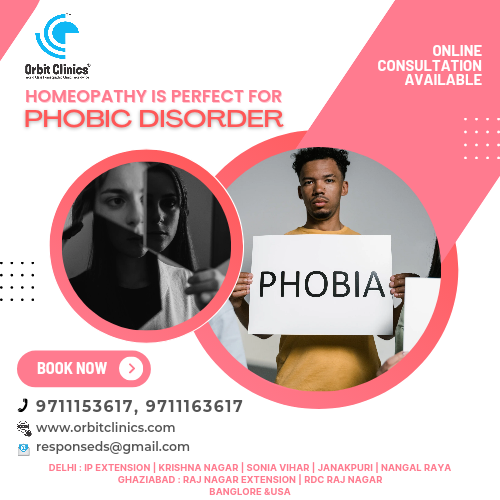Phobic disorders are a type of anxiety disorder that are characterized by excessive and irrational fear or anxiety in response to a specific object or situation. The fear or anxiety is so intense that it interferes with the individual’s daily life and activities.
Causes:
The exact causes of phobic disorders are not known, but they are believed to be caused by a combination of genetic, environmental, and psychological factors. Some people may have a genetic predisposition to anxiety disorders, while others may develop phobias as a result of a traumatic event or a learned behavior.
Risk factors:
Some factors that may increase the risk of developing a phobic disorder include:
- Family history of anxiety disorders or phobias
- Personal history of anxiety or depression
- Traumatic experiences, such as physical or emotional abuse
- Exposure to a specific object or situation that triggers fear or anxiety
- Chronic stress or life changes, such as moving or changing jobs
Types:
There are several types of phobic disorders, including:
- Specific phobia: A fear of a specific object or situation, such as heights, animals, or flying.
- Social phobia: A fear of social situations or performance situations, such as public speaking or meeting new people.
- Acrophobia – Fear of heights
- Agoraphobia – Fear of crowded or public places
- Aichmophobia – Fear of needles or sharp objects
- Amaxophobia – Fear of riding in a car
- Androphobia – Fear of men
- Arachnophobia – Fear of spiders
- Astraphobia – Fear of thunder and lightning
- Autophobia – Fear of being alone
- Aviophobia – Fear of flying
- Agyrophobia – Fear of crossing streets
- Allodoxaphobia – Fear of opinions
- Anuptaphobia – Fear of staying single
- Aurophobia – Fear of gold
- Barophobia – Fear of gravity
- Bibliophobia – Fear of books
- Brontophobia – Fear of storms
- Cacophobia – Fear of ugliness
- Claustrophobia – Fear of enclosed or small spaces
- Coulrophobia – Fear of clowns
- Demophobia – Fear of crowds
- Dentophobia – Fear of dentists or dental procedures
- Didaskaleinophobia – Fear of going to school
- Emetophobia – Fear of vomiting
- Entomophobia – Fear of insects
- Ephebiphobia – Fear of teenagers
- Gamophobia – Fear of marriage
- Gephyrophobia – Fear of bridges
- Gerascophobia – Fear of growing old
- Glossophobia – Fear of public speaking
- Hemophobia – Fear of blood
- Herpetophobia – Fear of reptiles
- Hydrophobia – Fear of water
- Hypochondria – Fear of having a serious illness
- Iatrophobia – Fear of doctors
- Ichthyophobia – Fear of fish
- Katsaridaphobia – Fear of cockroaches
- Keraunophobia – Fear of thunder
- Kinemortophobia – Fear of zombies
- Ligyrophobia – Fear of loud noises
- Melissophobia – Fear of bees
- Mysophobia – Fear of germs or dirt
- Necrophobia – Fear of death or dead things
- Nyctophobia – Fear of the dark
- Ophidiophobia – Fear of snakes
- Ornithophobia – Fear of birds
- Panphobia – Fear of everything
- Pathophobia – Fear of disease
- Pedophobia – Fear of children
- Phasmophobia – Fear of ghosts
- Philophobia – Fear of love or falling in love
- Phonophobia – Fear of loud sounds
- Pogonophobia – Fear of beards
- Pyrophobia – Fear of fire
- Selenophobia – Fear of the moon
- Somniphobia – Fear of sleep
- Spectrophobia – Fear of mirrors
- Thanatophobia – Fear of dying
- Tokophobia – Fear of childbirth
- Topophobia – Fear of certain places or situations
- Triskaidekaphobia – Fear of the number 13
- Trypanophobia – Fear of needles or injections
- Turophobia – Fear of cheese
- Venustraphobia – Fear of beautiful women
- Vestiphobia – Fear of clothing
- Xenophobia – Fear of strangers or foreigners
- Zoophobia – Fear of animals
Here are 10 most common homeopathic remedies that may be used for phobic disorders:
- Aconitum napellus: This remedy may be helpful for phobic disorders that develop after a sudden and intense shock or trauma. Symptoms may include anxiety, restlessness, and fear.
- Argentum nitricum: This remedy may be helpful for phobic disorders that involve social anxiety or fear of performance. Symptoms may include anxiety, nervousness, and trembling.
- Arsenicum album: This remedy may be helpful for phobic disorders that involve fear of illness or contamination. Symptoms may include anxiety, restlessness, and obsessive thoughts.
- Calcarea carbonica: This remedy may be helpful for phobic disorders that involve fear of the unknown or fear of failure. Symptoms may include anxiety, perfectionism, and lack of self-confidence.
- Gelsemium sempervirens: This remedy may be helpful for phobic disorders that involve fear of anticipation or fear of the future. Symptoms may include anxiety, nervousness, and trembling.
- Lycopodium clavatum: This remedy may be helpful for phobic disorders that involve fear of public speaking or fear of being judged. Symptoms may include anxiety, low self-esteem, and digestive issues.
- Phosphorus: This remedy may be helpful for phobic disorders that involve fear of crowds or fear of the dark. Symptoms may include anxiety, restlessness, and difficulty sleeping.
- Pulsatilla: This remedy may be helpful for phobic disorders that involve fear of abandonment or fear of being alone. Symptoms may include anxiety, emotional sensitivity, and a desire for attention.
- Silicea: This remedy may be helpful for phobic disorders that involve fear of needles or fear of invasive medical procedures. Symptoms may include anxiety, nervousness, and physical weakness.
- Thuja occidentalis: This remedy may be helpful for phobic disorders that develop after a traumatic event or after a history of abuse. Symptoms may include anxiety, fearfulness, and a desire for privacy.
And many more according to individual symptoms
A few more tips to fight with phobic disorders
- Eat a healthy and balanced diet: Eating a healthy diet that is rich in whole foods, fruits, vegetables, and lean proteins can help improve overall health and reduce stress levels. Additionally, avoiding processed and sugary foods may also help manage anxiety symptoms.
- Exercise regularly: Regular exercise is a proven way to reduce stress and anxiety levels. Exercise can also help improve mood and promote relaxation. Aim for at least 30 minutes of physical activity each day, such as walking, jogging, or yoga.
- Practice relaxation techniques: Relaxation techniques, such as deep breathing, meditation, and progressive muscle relaxation, can help reduce stress and anxiety levels. These techniques can also be helpful during a phobic episode.
- Get enough sleep: Getting enough sleep is crucial for managing anxiety symptoms. Aim for at least 7-8 hours of sleep each night, and establish a consistent sleep routine.
- Limit caffeine and alcohol: Caffeine and alcohol can both exacerbate anxiety symptoms, so it’s important to limit or avoid these substances.
Seek professional help: While diet and exercise can be helpful, it’s important to seek professional help for phobic disorder. A mental health professional can provide therapy, medication, or other treatments that can effectively manage symptoms and improve overall quality of life.



